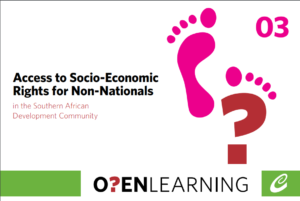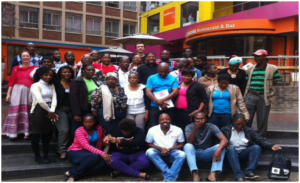Completed Projects
Access to Socio-Economic Rights for Non-Nationals in the Southern African Development Community
 While many countries in Africa are contemplating ways in which to extend access to social protection for their citizens, the enjoyment of socio-economic rights by non-nationals receives scarce commentary. Despite the existence of international, continental and regional instruments and treaties that guarantee both access to socioeconomic rights for all and equality within states of nationals and non-nationals, for many these rights remain paper rights.
While many countries in Africa are contemplating ways in which to extend access to social protection for their citizens, the enjoyment of socio-economic rights by non-nationals receives scarce commentary. Despite the existence of international, continental and regional instruments and treaties that guarantee both access to socioeconomic rights for all and equality within states of nationals and non-nationals, for many these rights remain paper rights.
This report was commissioned by the Open Society Initiative of Southern Africa (OSISA) to inform their advocacy strategy for the next five years in the SADC region in respect of the rights of non-nationals, as well as the crosscutting issues of access to socio-economic rights (including health rights) that address the requirements of people affected or infected by HIV and AIDS. It was agreed at the beginning of the enquiry that an investigation of this nature should be accompanied by an enquiry into the levels of access of nationals themselves to socioeconomic rights in each country, in addition to questions of access by non-nationals.
No end in sight for the poor and marginalised: Basic Needs Basket indicates
 The Basic Needs Basket (BNB) is a monthly survey that tracks the cost of 38 food and non-food items across nine provinces in South Africa. The food and non-food items comprise the minimum basket of goods that are commonly purchased by households and reflect the lived realities for households in South Africa. The selected tracked food and non-food prices are building on the Household Expenditure Survey (HES), undertaken in 2011- 2012 by SPII with the support of Statistics South Africa in Evaton, South Africa. In that HES, each household would provide the purchased products in the household every month and these food and non-food prices were further explored through focus-group discussions in Alexandra Township (Gauteng), Ngove (Limpopo) and Evaton (Gauteng) in 2014 with different groups, including youth, women and the elderly. SPII in partnership with the Association of Community-Based Advice Offices of South Africa (ACAOSA) have 18 dedicated fieldworkers across the nine provinces that collect data on the 38 identified food and non-food prices every month. There are two data points in each province, in an urban1 and rural2 setting.
The Basic Needs Basket (BNB) is a monthly survey that tracks the cost of 38 food and non-food items across nine provinces in South Africa. The food and non-food items comprise the minimum basket of goods that are commonly purchased by households and reflect the lived realities for households in South Africa. The selected tracked food and non-food prices are building on the Household Expenditure Survey (HES), undertaken in 2011- 2012 by SPII with the support of Statistics South Africa in Evaton, South Africa. In that HES, each household would provide the purchased products in the household every month and these food and non-food prices were further explored through focus-group discussions in Alexandra Township (Gauteng), Ngove (Limpopo) and Evaton (Gauteng) in 2014 with different groups, including youth, women and the elderly. SPII in partnership with the Association of Community-Based Advice Offices of South Africa (ACAOSA) have 18 dedicated fieldworkers across the nine provinces that collect data on the 38 identified food and non-food prices every month. There are two data points in each province, in an urban1 and rural2 setting.
Recent Posts
- Can we afford NOT to have a BIG in South Africa? – Podcast
- Joint Stakeholder Submission on the Right to Adequate Standard of Living in South Africa
- SPII’s Contribution – Submission to UN CESCR
- Political Elites Must Break Ranks to Crush Poverty, Inequality
- Podcast: High Price to Pay for the Rising Cost of Living
- More People Believe They Are Living Under Poverty in South Africa
- Nkululeko Majozi Speaking on Subjective Poverty in South Africa
- Podcast: In The Ring With Eusebius McKaiser – Can we afford a Basic Income Grant?
- Extending the Social Relief of Distress grant is not enough to alleviate plight of poor, says civil society
- Global Basic Income Grant Pilots Since 2000











